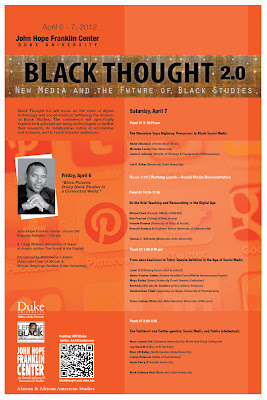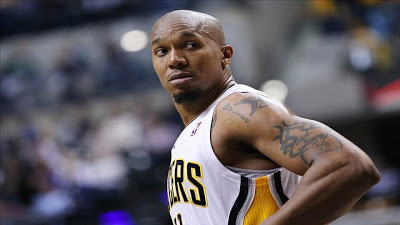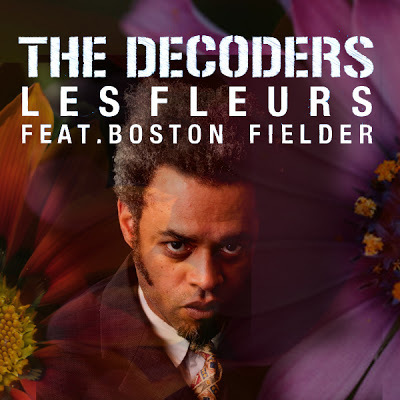Mark Anthony Neal's Blog, page 1011
March 30, 2012
New Study: Hiding Emotions May Exacerbate Depression Among Black Men Who Confront Racial Discrimination

News Release | UNCNews
Hiding Emotions May Exacerbate Depression Among Black Men Who Confront Racial Discrimination
Wednesday, March 14, 2012
Enduring subtle, insidious acts of racial discrimination is enough to depress anyone, but African-American men who believe that they should respond to stress with stoicism and emotional control experience more depression symptoms, according to new findings from the University of North Carolina at Chapel Hill.
The study, "Taking It Like a Man: Masculine Role Norms as Moderators of the Racial Discrimination–Depressive Symptoms Association Among African-American Men," was published online March 8, 2012, in the American Journal of Public Health.
"We know that traditional role expectations are that men will restrict their emotions – or 'take stress like a man,'" said study author Wizdom Powell Hammond, Ph.D., assistant professor of health behavior in UNC's Gillings School of Global Public Health. "However, the more tightly some men cling to these traditional role norms, the more likely they are to be depressed.
"It also is clear that adherence to traditional role norms is not always harmful to men," Hammond said. "But we don't know a lot about how these norms shape how African-American men confront stressors, especially those that are race-related."
Hammond studied the phenomenon researchers call everyday racism, which is marked not so much by magnitude or how egregious the prejudice and torment were, but by persistence and subtlety. "It chips away at people's sense of humanity and very likely at their hope and optimism," Hammond said. "We know these daily hassles have consequences for men's mental health, but we don't know why some men experience depression while others do not."
Hammond studied data collected from surveys of 674 African-American men, aged 18 and older, carried out at barber shops in four U.S. regions between 2003 and 2010.
She found that everyday racial discrimination was associated with depression across all age groups. Younger men (aged under 40) were more depressed, experienced more discrimination and had a stronger allegiance to norms encouraging them to restrict their emotions than men over 40 years old. Furthermore, some men who embraced norms encouraging more self-reliance reported less depression.
The results showed associations, not necessarily causation, Hammond noted.
The data also showed that when men felt strongly about the need to shut down their emotions, then the negative effect of discrimination on their mental health was amplified. The association was particularly apparent for men aged 30 years and older.
"It seems as though there may be a cumulative burden or long-term consequences of suffering such persistent discriminatory slights and hassles in silence," Hammond said. "Our next task is to determine when embracing traditional role norms are harmful or helpful to African American men's mental health."
The information will help target future interventions to subgroups of men, rather than try to reach all men with one general approach.
"African-American men are not all alike, just as all people in any group are not alike," Hammond said. "The way they feel, respond and react changes over time as they normally develop. The slings and arrows of everyday racism still exist, and we need to find targeted ways to help men defend against them while also working to address the policy structures that project them."
Currently, Hammond is part of the 2011-2012 class of White House Fellows. Founded in 1964, the leadership and public service program offers fellows a first-hand experience working at the highest levels of the federal government.
Hammond also is a member of the UNC Lineberger Comprehensive Cancer Center.
The study is available at http://ajph.aphapublications.org/doi/abs/10.2105/ajph.2011.300485.
Media note: Hammond can be reached at wizdomp@email.unc.edu.
Gillings School of Global Public Health contact: Ramona DuBose, (919) 966-7467, ramona_dubose@unc.edu
Lineberger Comprehensive Cancer Center contact : Dianne Shaw, (919) 966-5905, dianne_shaw@med.unc.edu
News Services contact: Patric Lane, (919) 962-8596, patric_lane@unc.edu
Published on March 30, 2012 19:58
Deconstructing the "Dougie": Thomas DeFrantz on the Importance of Black Social Dance
Duke University Professor Thomas F. DeFrantz, author of Dancing Revelations: Alvin Ailey's Embodiment of African American Culture , discusses the importance of Black Social Dance like "The Dougie" and "The Charleston (Cake Walk)".
Published on March 30, 2012 12:30
Bun's Beat: Bun B Addresses New Noise Ordinance in Houston & the Creation of a Musician PAC
Published on March 30, 2012 07:51
March 29, 2012
"Les Fleurs": The Decoders feat. Boston Fielder
Published on March 29, 2012 15:23
"Violence Against Women is as American as Apple Pie"--Rep Gwen Moore (Wisc.) Gives Witness to Violence Against Women
from Care2 :
In a bold move, Congresswoman Gwen Moore of Wisconsin introduced the Violence Against Women Reauthorization Act by sharing her personal experience as a rape and domestic violence survivor.
Read more: http://www.care2.com/causes/congresswoman-recounts-rape-violence-to-introduce-violence-against-women-act.html#ixzz1qVvu8xhw
Published on March 29, 2012 06:58
March 28, 2012
What If Du Bois had Twitter? Trailer for Black Thought 2.0 Conference
Black Thought 2.0: New Media and the Future of Black Studies
April 6-7,2012DukeUniversityThe John HopeFranklin Center
Black Thought 2.0 willfocus on the roles of digital technology and social media in furthering themission of Black Studies. The conference will specifically explore how scholarsare using technologies to further their research, do collaborative forms of scholarshipand activism, and to reach broader audiences.
*All panels will be streamed and tweeted liveFriday April 6, 2012
Reception—5:30pmJohn HopeFranklin Center Gallery Space
Keynote Address—7:00 pmBlackFutures: Doing Black Studies in a Connected World
S. Craig Watkins (Universityof Texas at Austin, author The Young& the Digital)
Introduced by Wahneema Lubiano (Associate Chair ofAfrican & African American Studies, Duke University)
Saturday, April 7, 2012
Panel #1 9-10:15 amThe Chocolate Supa Highway: Precursors to Black Social Media
Abdul Alkalimat (University of Illinois)Michelle Ferrier (ElonUniversity)Lynne d Johnson (Director ofStrategy & Engagement at Whisprgroup)Lee D. Baker (Moderator, DukeUniversity)***
Panel #2 10:30-11:45On the Grid: Teaching and Researching in the DigitalAge
Allison Clark (FounderAMedia1/HASTAC)Kim Pearson (College of NewJersey)Simone Browne (Universityof Texas at Austin)Howard Rambsy II (SouthernIllinois University at Edwardsville)Thomas F. DeFrantz (Moderator,Duke University)
***
Noon-1:15 | Working Lunch—Social Media Demonstration
***
Panel #3 1:30-2:45 pmFrom Jena Louisiana to Tahrir Square: Activism in the Age ofSocial Media
Jasiri X (Pittsburg basedartist & activist)Alexis Pauline Gumbs (BrokenBeautiful Press/Mobile Homecoming Project)Moya Bailey (EmoryUniversity/Crunk Feminist Collective)Kimberly Ellis aka Dr.Goddess (artist, activist, historian)Salamishah Tillett (Universityof Pennsylvania)Treva Lindsey (Moderator,University of Missouri)
***
Panel #4 3:00-4:30The Twitterati and Twitter-gentsia: Social Media and PublicIntellectuals
Marc Lamont Hill (ColumbiaUniversity/Our World with BlackEnterprise)Jay Smooth (Editor of IllDoctrine)Blair LM Kelley (NorthCarolina State University)Latoya Peterson (Editor ofRacialicious)Imani Perry (PrincetonUniversity)Mark Anthony Neal (Moderator,Duke University)
***
Published on March 28, 2012 17:28
Black Thought 2.0 Conference at Duke Imagines the Future of Black Studies and New Media

Black Thought 2.0 Conference April 6-7
Public Conference Brings Together Black Intellectuals to Discuss Social Media and the Future of Cultural Studies
***
Durham, NC - More than a dozen prominent African-American scholars will participate in a conference on the role of social media in cultural studies, April 6-7 at Duke University.
The two-day conference, "Black Thought 2.0: New Media and the Future of Black Studies," will be held at the John Hope Franklin Center (2204 Erwin Road) and is free and open to the public.
To register, go to the conference website. Parking is available in the Pickins Center visitor lot across the street.
For those unable to attend, the conference will be streamed live on Duke's Ustream channel and viewers can tweet questions for the panelists using the hashtag #BT2Duke.
S. Craig Watkins, the author of "The Young & the Digital" will deliver the keynote address at 7 p.m. Friday, April 6. Watkins is a communications professor at the University of Texas at Austin and researches young people's social and digital media behaviors.
The event begins Friday, April 6 with a 5:30 p.m. reception in the John Hope Franklin Center gallery. Watkins will speak in room 240.
The conference continues Saturday at 9 a.m. with panels "The Chocolate Supa Highway: Precursors to Black Social Media," and "On the Grid: Teaching and Researching in the Digital Age." Afternoon panels begin at 1:30 with "From Jena, La. to Tahrir Square: Activism in the Age of Social Media," and at 3:00 with "The Twitterati and Twitter-gentsia: Social Media and Public Intellectuals."
"In many ways Black Thought 2.0 is an attempt to encourage black scholars and academics to catch up to our audience," said conference organizer Mark Anthony Neal, a professor of black popular culture at Duke. "Given our rich tradition of public intellectuals, dating back to figures like Fredrick Douglass and Sojourner Truth, it just seems as though new media represents another way for black intellectuals to be in the world. Imagine what W.E.B. Dubois might have done with a Twitter feed?"
Other panelists include Jasiri X, a rapper who recently released "Trayvon," a tribute song for the slain teen; author Marc Lamont Hill, an education professor at Columbia University and the host of the nationally syndicated TV One program "Our World With Black Enterprise"; and Moya Bailey, a blogger for Crunk Feminist Collection best known for a organizing a protest as an undergraduate student at Spelman College against the rapper Nelly. Several Duke faculty will participate in the conference as well.
The conference is sponsored by Duke's Department of African and African American Studies, the John Hope Franklin Center for Interdisciplinary and International Studies, Left of Black and the Office of the Provost. For more information, go to blackthought.aaas.duke.edu.
Published on March 28, 2012 17:20
More than a Ball Player: The David West Interview

More than a Ball Player: The David West InterviewbyDavid Leonard | NewBlackMan
Oneof the more thoughtful and socially active professional athletes, David West ,a forward for the NBA's Indiana Pacers talked with NewBlackMan regular contributor David Leonard, about the current NBA season, the residue of the NBAlockout, the stereotypes of NBA players and what he's reading these days.
***
DJL– How has the compressed season been physically and mentally?
DW:The games are just coming. Itbecomes a grind. 4 games in 5nights. 12 games in 15 nights. This is physically taxing. There have been injuries around theNBA. You do what you can to getyour body prepared but sometimes the body won't respond. It is not going to get better.
DJL: How does the compressed season impact family
DW: Families are rarely taken into account in aregular season and that is even more of an issue this season. There is really no time. Guys make sacrifices in a normal seasonand that is even greater right now. There is less time to do anything outside of practice and games.
DJL: Describe your assessment of lockout looking backin terms of relationship between players and owners, how race played out
DW: I went to a few meetings and there was some cryptic language that wasused. I was offended by the ideawe may not understand certain things. Beyond that, when you are dealing with a certain amount of money inbusiness, there has to be a middle and level ground. In the media, we were portrayed as not knowing anything, asgreedy and selfish – to just shut up and play basketball. We expected that.
DJL: It seems that one of the struggles was battlingthe caricature of today's NBA player
DW: Every guy doesn't have the machine behindthem. As an individual, it is hardto fight the assumptions made about us. When I first entered the league, people were like "David, what are youtalking about" because I wasn't talking about basketball and I wasn't talkingabout mundane things that people expected from me. That puts into perspective what people expect of you; peopledon't expect athletes to have anything to offer other than being a source forentertainment. The mind is seen as2nd or 3rd rate. So often the conversation starts and ends with sports. You find yourself boxed in. I have been labeled as stand-offishbecause when people engage me they often just want to talk about basketball,and that is not what I always want to talk about. Most guys deal with it and just walk around in a bubblebecause there is no space for original thoughts from athletes withinsports.
DJL: What are your passions, what drives you?
DW: I am passionate about knowing more. Every day I wake up, I want to learn something new. I read a lot on African Americanhistory, African history, and history in general. I love to read; I want to be engaged with what is going onsocially. I love music, thelanguage that is inside the music, what guys are trying to say, especially withhip-hop. It doesn't have to be the"conscious rap." All rappers areconscious because they have the wherewithal and freedom to say something. Regardless of what you hear, even themost childlike rapper or those who rap at the highest level, there is a messagethere. I like to speak to youngpeople; I don't like to box myself in just because I have been successful as anathlete.
DJL: You mentioned that you like to read, what areyou reading right now
DW: Right now, I am reading Cheikh Anta Diop's Pre-colonialBlack Africa. I think it isimportant to know that we in the African American community have a historybefore America. As an athlete whatwe do is so routine, so there is so much time for the mind, time to engage yourbrain and your thought process. That is why I read. That is why I am who I am; that is why I do what Ido. People who have power,read. People who have power to beengaged and who can control their own movements, read. If you don't read and if you don't havethe ability to think critically, people are going to dictate what you do forthe rest of your life. They aregoing move you how they want to move you.
DJL: While you love basketball, it doesn't seem todefine you. Talk about that
DW: It can't because the average career is 3.5 or 4 years. A few guys are going to play 12-15 plusyears but not most. At the end ofthe day, when you retire you are 32 or 38, there is a lot of life left. You have to start preparing for yourlife after the NBA as soon as you enter the league. It is not going to be there forever. That is why you can't let thislife consume you; you can't let the NBA be the end all, be all, of who you areas a person.
DJL: Since we connected via twitter, I am curious howdoes twitter fit into your efforts to expand your reach and connection.
DW: I read your material from Professor Neal. When I became twitter literate, I foundthat the people that I wanted to follow were professors and educators, people Ididn't know. I follow a lot ofHistory and Africana professors, cultural critics, and news organizations,because that it is what I am interested in. Whether it be from Professor Neal'sposts, Left of Black or a professor who posts questions via twitter about thesubject matter within their classroom. I also like the immediacy of the news asit comes in through twitter.
***
David J. Leonard is Associate Professor in the Department of CriticalCulture, Gender and Race Studies at Washington State University, Pullman. Hehas written on sport, video games, film, and social movements, appearing inboth popular and academic mediums. His work explores the political economy ofpopular culture, examining the interplay between racism, state violence, andpopular representations through contextual, textual, and subtextualanalysis. Leonard's latest book After Artest: Race and the Assault on Blackness will bepublished by SUNY Press in May of 2012.
Published on March 28, 2012 10:04
March 27, 2012
Sonia Sanchez on Her First Visit to the Schomburg Library
Poet, playwright, activist and educator, Sonia Sanchez is best known as one of the architects of the Black Arts Movement, one of the most prolific periods of African American cultural production in the United States. She talks with the National Visionary Leadership Project about her first visit to the then Schomburg Library more than forty years ago.
Published on March 27, 2012 18:59
Buck, Wing & Jig: Thomas DeFrantz on the Roots of Black Social Dance
How did dances on slave plantations develop into the Charleston and the Kid n' Play? Duke University Professor Thomas DeFrantz demonstrates three traditional African American social dances.
Published on March 27, 2012 07:11
Mark Anthony Neal's Blog
- Mark Anthony Neal's profile
- 30 followers
Mark Anthony Neal isn't a Goodreads Author
(yet),
but they
do have a blog,
so here are some recent posts imported from
their feed.




